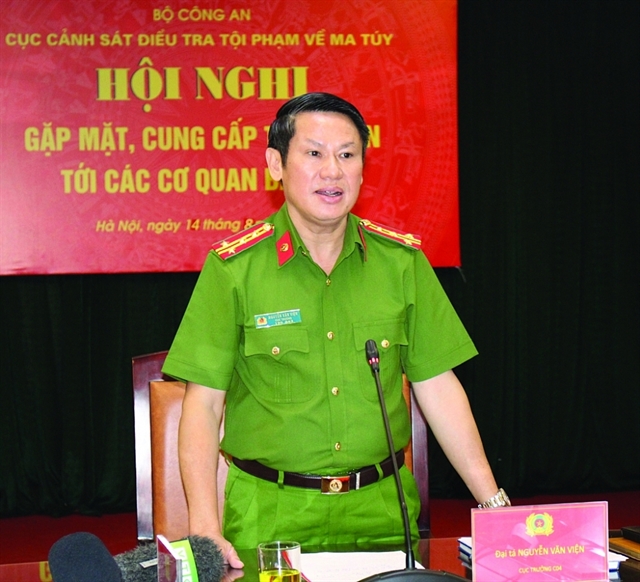 Society
Society


|
| Colonel Nguyễn Văn Viện, director of Drug-related Crime Investigation Police Department under the Ministry of Public Security. — Photo haiquanonline.com.vn |
Colonel Nguyễn Văn Viện, director of the Drug-related Crime Investigation Police Department under the Ministry of Public Security, talks to Hải quan (Customs) e-newspaper about transnational drug crimes
Drug crimes, especially transnational crimes, still show no signs of reduction, why is this?
Recently, all kinds of crimes have been very complex, especially drug crimes. Through analysis, assessment, forecasting and practice of combating drug crimes, the drug crime situation in Việt Nam continues to be directly affected by the world’s and region’s drug crime situation, especially the "Golden Triangle" area.
Specifically, on the Việt Nam-Laos border, the illegal trafficking and transportation of narcotics have increased sharply, especially synthetic drugs. This is the route directly affected by the illegal production and sale of drugs from the Golden Triangle into the country, with support of drug crime gangs in drug “hotspots” along the border.
On the Việt Nam-Cambodia border, drug trading from the Golden Triangle through Thailand, Laos and Cambodia to Việt Nam have also increased. Some people take advantage of Cambodia to travel, visit relatives, do business, trade and gamble to commit drug crimes. Some addicts go to Cambodia to illegally buy and sell narcotics.
In the Việt Nam-China border area, drugs, mainly heroin, are bought and sold, transported from abroad to Việt Nam and then transported to China. Recently, the police of Việt Nam and China have strengthened co-ordination in giving education and tackling criminals, and illegal trading and transportation of synthetic drugs from China to Việt Nam has decreased, but there is always potential complexity, with the risk of Chinese people transferring capital, human resources, means and techniques to other countries, including Việt Nam, to organise illegal drug production.
The sea route continues to be used by criminals to buy, sell and transport drugs in large quantities from abroad to Việt Nam and from Việt Nam to third countries. The key point is seaports in the south such as HCM City and Bà Rịa-Vũng Tàu. The traffickers' tricks are to take advantage of import-export goods to disguise drugs in goods containers to be shipped abroad.
What should customs and police forces focus on to fight drug crimes?
The drug-related crime police force continues to work with concerned organisations to strongly fight drug-related crimes, effectively implement attacks and maintain security and order serving the 75th anniversary of the National Day of the Socialist Republic of Việt Nam (September 2, 1945-September 2, 2020) and related major events.
As for the co-ordination between concerned organisations, in the context of the country's deep international integration in investment, trade, tourism is developing, but also leads to many risks of crimes and transnational drug offences.
In fact, the results of recent work show transnational illegal trading and transporting of narcotics has been led by foreigners, colluding with Vietnamese people in Việt Nam. They set up a fake company operating with sophisticated and cunning tricks, taking advantage of import-export goods to transport drugs. Therefore, co-operation among forces must be strengthened so the fight and destruction can be prompt and effective and direct co-ordination must be well performed.
To contribute to the effective implementation of co-ordination among forces, the Drug-related Crime Investigation Police Department is working with other concerned units to develop a draft decision amending and supplementing Decision 133/2002/QĐ-TTg. The responsibilities of each force in performing the task of combating drug crime will be made more clear. — VNS




